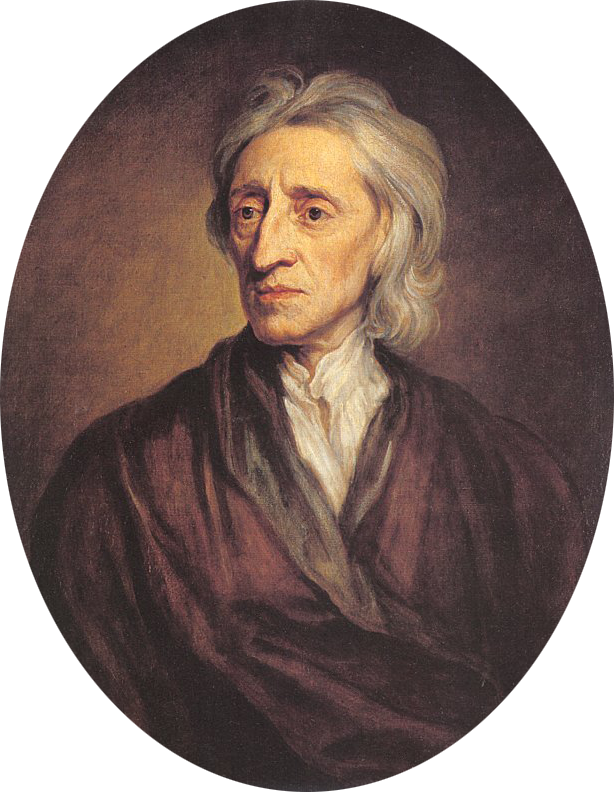The concepts covered in this factsheet go beyond those seen in secondary school. It is intended as a supplement for those who are curious to learn more.
Although it is possible to summarise the main ideas of the Enlightenment, it should not be forgotten that these ideas were developed by several individuals. This is why the main philosophers are presented here.
As a young man, this English philosopher lived through the English Revolution. His youth was therefore mainly marked by the major transformations in British society in the 17th century.
After studying linguistics, philosophy, medicine and the physical sciences, Locke turned to politics. He was responsible for the monetary Reformation, the creation of the Bank of England and the colonies. He wrote his main work while in France in 1671. His text, Essay on Human Understanding, has been translated into several languages.
In general, Locke advocated an experimental method, like that proposed by Descartes. This experimental method applied to science. According to Locke, science comprises three areas: physics, ethics and semiotics (the study of signs).
Locke advocated three main values: the natural equality of men, a representative system of politics and establishing the limits of sovereignty on the basis of individual rights. He thus rejected any idea of man's subordination to a sovereign. All men are free and equal. Governments are therefore associations created by free men.
Locke developed mainly his theory of the social contract. This contract is the foundation of society, in the individuals. He points out that society is an artificial creation, created by the decisions of the people who make it up. There are therefore very strong links between people and the society in which they live. It is the group that creates society.
Locke has often been regarded as the model and precursor of the Enlightenment philosophers. His concept of the social contract influenced many philosophers. All of his ideas had a profound influence on Rousseau and the philosophers of the American Revolution.
As a young man, Voltaire was shocked to find that the rights of intelligence and merit were generally flouted by the privilege of birth. Faced with these frustrations, he was quickly seduced by the English constitution.
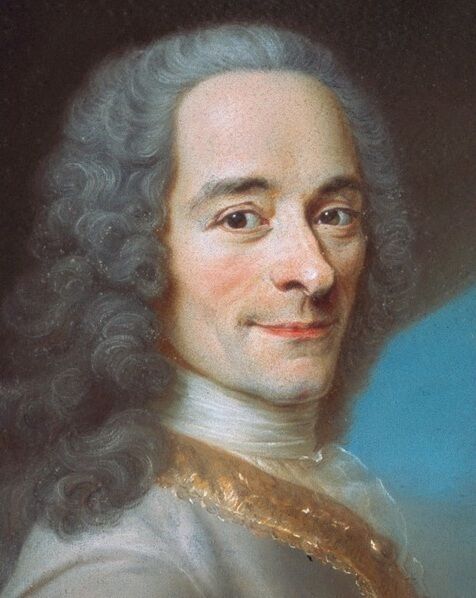
His work is rich and includes both philosophical and literary texts. In his philosophical texts, he harshly criticises French institutions. Even in his philosophical tales, his ideas emerge through the events and characters. Voltaire is not always considered a philosopher because he always rejected metaphysics. He could not accept people relying on Providence in the face of unfortunate events. He much preferred people who acted on their own.
Action is also an important part of Voltaire's philosophy. According to him, action is the goal of human life: it is better to work and build than to do nothing. What's more, this action should lead to the pursuit of happiness on Earth. His vision of happiness changed radically with age. From the epicurean he was in his youth, he went on to place his trust in progress, before finally adopting a more pessimistic attitude. Man then had to make do with relative happiness. Work became a means of making life more bearable.
Voltaire described himself as a deist: he believed in God. According to him, God is necessary to the order of the world. However, Voltaire was not a religious man. He fought against fanaticism, intolerance, dogma, the hierarchy of the Church and Catholic worship. He prefers to believe that all people are children of the same universal God, which calls for mutual tolerance. The religion he proposed was a natural religion, closer to human brotherhood than to true religion, because it was devoid of any mythical content. This vision of religion also changes the relationship with morality. In this view, morality alone should guide personal conscience.
Voltaire's entire oeuvre is characterised by virulent criticism, irony and disrespect for the abuses of political regimes. His works highlight his ideal of justice and freedom. The form of political management he proposed was enlightened despotism. This system worked with a king who allowed himself to be guided by philosophy. His dream was quickly disappointed. This is why he favours the English regime, which represents the ideal in practical terms. Voltaire therefore called for judicial reforms, the abolition of torture and arbitrary imprisonment, and for more information to be provided in cases of crime.
From the end of his studies, Montesquieu was interested in law. His major work is on the law: The Spirit of the Laws. In this text, he proposes several theories on laws, governments and politics. According to him, laws have physical and moral causes.
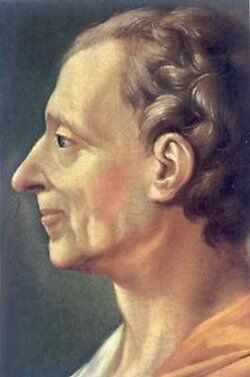
It was Montesquieu who coined the term ‘categories of power’. It was he who proposed the distinction between legislative, judicial and executive powers.
Montesquieu had several influences on his writing. Firstly, he read and studied several authors from Antiquity, such as Plato and Aristotle. He also read more recent texts, such as those by Machiavelli. In addition to these references, he drew on his own knowledge and experience of politics and science.
In one of the sections of his essay, Montesquieu analyses possible government structures. He proposes a new classification of governments based on the number of people in power. He distinguishes between republics (democratic or aristocratic), monarchies and despotism.
Democratic republics
In a democratic republic, all citizens are sovereign. In a system like this, laws and suffrage are really important. The people elect the magistrates who will govern them, always favouring the general interest over the individual interest, since people are equal: they are everything.
The aristocratic republic
In the aristocratic republic, certain nobles are sovereign. These nobles are distinguished by birth and are prepared for power through education. For an aristocratic republic to function, the leaders must manage with moderation, taking human dignity into consideration. If the nobles forget the spirit of moderation, there is a risk of corruption. The dangers of the aristocratic republic are demagoguery and corruption, which can occur among magistrates. Demagogy and corruption can lead to tyranny.
Monarchy
In a monarchy, only one person has power: the king. The king rules according to strict Papal edict. The intermediate powers (nobility, clergy, towns) ensure that the king does not abuse his power. When the intermediate powers are too weak, there is a risk of corruption and despotism.
Despotism
Despotism represents a territory managed by a single person who wields arbitrary and unlimited power. Subjects obey for fear of repercussions. The despot's aim is to preserve the tranquillity of his kingdom. In a despotic regime, knowledge and education represent a danger to the king, since ignorance is essential to the obedience of subjects.
According to Montesquieu, it was King Louis XIV who corrupted monarchy. His way of managing France would have created the transition to despotic government. According to Montesquieu, the transition to despotism can only lead to disaster. However, despotism seems to be the direction taken by many peoples.
This tendency is stronger in warmer countries. In his theory of climates, Montesquieu states that climate affects the temperament of individuals and, consequently, the form of government. This theory would explain why in colder climates (such as England), the strong man who is not sensitive to pleasure would create a monarchy of liberty, whereas in warmer climates (such as France), people being lazier, prefer despotism, which reduces the responsibility of the people.
However, Montesquieu was careful not to assert that climate alone determines government. According to him, climate is only one factor among others: religion, laws, maxims of government, etc. The dominant variable always varies according to the country. The dominant variable always varies from nation to nation.
As soon as his essay appeared, Europeans showed great interest in these new ideas. People all over Europe read and discussed Montesquieu. But he also received a lot of criticism. The most virulent came from the team at the Encyclopédie, who felt that he did not make enough of the achievements of the past, was not philosophical enough and was too conservative. Moreover, the American Constitution was heavily influenced by Montesquieu.
Jean-Jacques Rousseau spent part of his youth as a runaway or wanderer. His mother was orphaned and his father abandoned him a few years after his birth. His education was therefore shaped by his runaways and the encounters he made during them. As soon as he arrived in Paris, he befriended Diderot, who asked him to take part in his Encyclopaedia project.
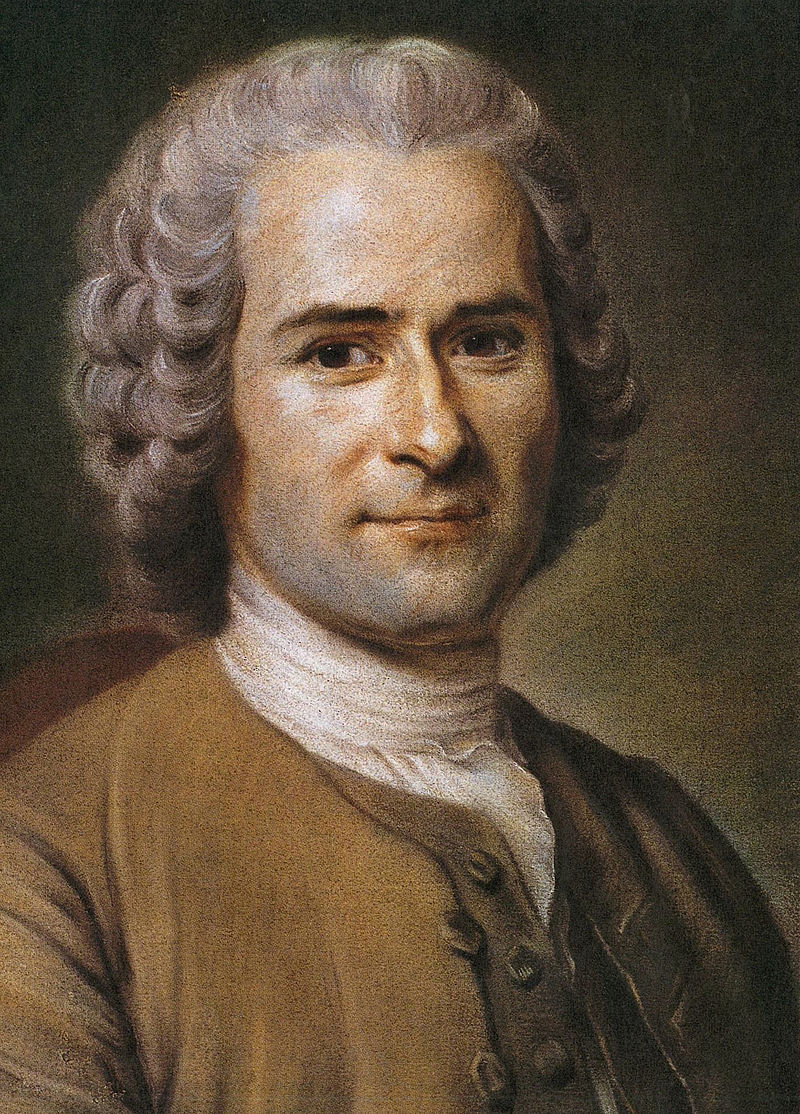
Influenced by Machiavelli, Rousseau wrote extensively, including two essays: Discourse on the Sciences and the Arts and The Social Contract.
The text of the Discourse on the Sciences and the Arts explains above all the idea that we often retain from Rousseau: Man is born naturally good and happy; it is society that corrupts him and makes him unhappy. With this idea, Rousseau rejected the notion of original sin.
His main work, The Social Contract, published in 1762, is devoted to analysing the principles of political law. Defending human freedom and equality, he defines the social order as the sum of individual freedoms and the requirements of life in society. This idea, along with the entire text, inspired the Declaration of the Rights of Man. His ideas also inspired the American Revolution and the Constitution of 1789.
The best sovereign is the people. It is the people who must enact the general will. This idea is inspired by that of the social contract. The consent of the people is required for decisions to be taken. In this vision, individual freedom is preserved because everyone gains more (freedom, morality, virtue) than they lose (obedience). Formal equality thus replaces the natural inequality conveyed by monarchy.
The general will of the nation is not limited to the sum of all the individual wills. Morality is added to these. In this way, decisions are taken by majority vote. The erring minority must then submit to the majority. The individual is seen as part of the whole.
Since fully democratic government is only possible in extremely small territories, Rousseau suggested an aristocratic form of government based on elections. In his view, this was the best way to govern a large state. He rejected a monarchy in which the king usurped the sovereignty of the commoners or the people. However, when the government was threatened, he made it clear that the leaders could establish a temporary dictatorship.
In practice, he asserts that democracy is a utopia that is only possible in small states. Despotism may therefore be necessary.
Rousseau was in favour of an unlimited natural religion. He made it clear that he believed in God, but that it was hardly possible to have access to God without sacred texts, institutions and clergy. His natural religion was therefore inspired by deism: few dogmas, no preaching of intolerance and the absence of religious institutions.
In his youth, Diderot led a bohemian life during which he lost his faith. From the outset, he opposed Christianity and the institution. However, his personal beliefs evolved. While he was a deist in favour of natural religion, scepticism took over. Later on, his ideas on the subject came to dominate his faith and his conception of the world. According to him, there is only one substance and that is matter. It is matter, moreover, that ensures the transition to life, evolving in a continuous cycle.
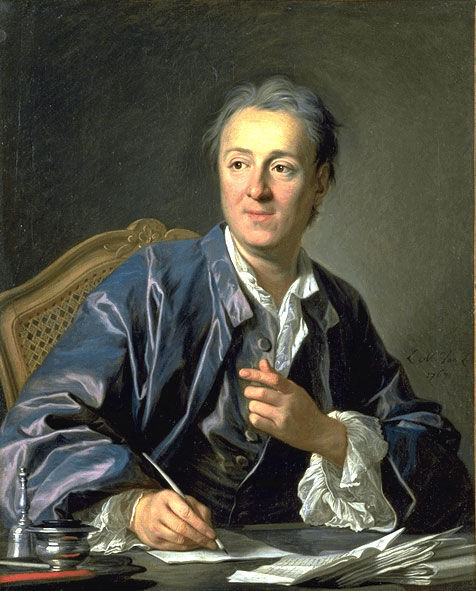
In 1747, Diderot was asked to run the Encyclopaedia with d'Alembert. He devoted himself to this task for 20 years. During these years, he wrote other works. All these tasks were motivated by the concern and ambition to define the true nature of Man and his place in the universe. Throughout his life, he developed his philosophical and political ideas. According to him, universal morality is based on man's natural feelings combined with his reason.
During his studies, d'Alembert was initially interested in law and medicine. He then turned to mathematics and science, working on fluid mechanics and integral calculus.
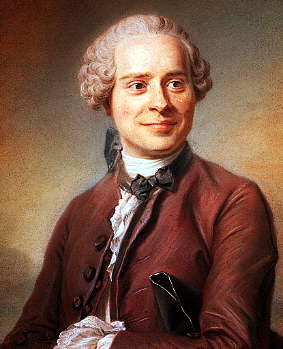
D'Alembert wrote treatises (Traité de la dynamique, Réflexions sur la course générale des vents). Throughout his research and his contribution to the Encyclopaedia, he emphasised the links between scientific progress and social progress. Through his scientific research, he fought against religious and political obscurantism.
The Encyclopaedia, produced in the 18th century, is the emblem of the philosophy of Enlightenment. A vast project led mainly by Diderot and d'Alembert, the Encyclopaedia is an impressive source of information on philosophy and science.
Responsible for managing the production and publishing of the Encyclopaedia, Diderot and d'Alembert had to organise the content, find collaborators and manage the entire production process. The editors entrusted the task to two people who were recognised in their respective fields: Diderot in philosophy and d'Alembert in mathematics.
The Encyclopaedia was a real publishing venture, carried out between 1751 and 1766. Initially, the publishers wanted to translate the Cyclopaedia, which had been published in English. They entrusted Diderot and d'Alembert with the task of translation. The title of the work became: Encyclopédie ou Dictionnaire raisonné des sciences, des arts et des métiers.
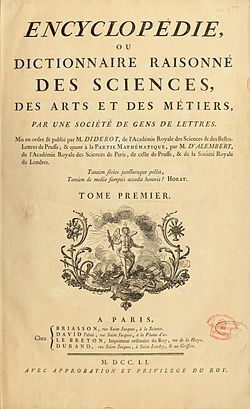
Their ambitions soon changed. From a simple translation, the aim was now to take stock of the achievements of the human mind and to disseminate the philosophy of Enlightenment. Diderot and d'Alembert therefore called on a number of collaborators, including well-known authors such as Montesquieu, Voltaire and Rousseau. At the time, d'Alembert was responsible for mathematics and Diderot for history and philosophy. The intended audience was the commoners or the people.
In his article entitled Encyclopaedia, Diderot defines the Encyclopaedia's vast project. This overall project encompassed three philosophical objectives: to bring together the knowledge acquired by humanity, to criticise religious fanaticism, and to glorify reason and freedom of thought.
To achieve this, Diderot explained that he had to synthesise and sort human knowledge, and then classify and organise it by building a genealogy, a tree of knowledge. Diderot presents this as anti-religious, because in his view, only knowledge built by man is necessary for happiness.
The classification of knowledge
Diderot organised the articles in a rational order: alphabetical order. In addition, he set up a system of cross-references to guide the reader through this immense forest of knowledge. This system of cross-references is organised in such a way as to provoke historical reflection and put knowledge into perspective.
The first volume of the Encyclopaedia appeared in 1751 and was an immediate European success. The same was not true of the other volumes, which appeared between 1752 and 1756. The project became the talk of the town. In fact, it was censored and banned. The authors were accused of propagandising Enlightenment ideas. As a result, d'Alembert withdrew from the project. However, the last 10 volumes were published in 1766.
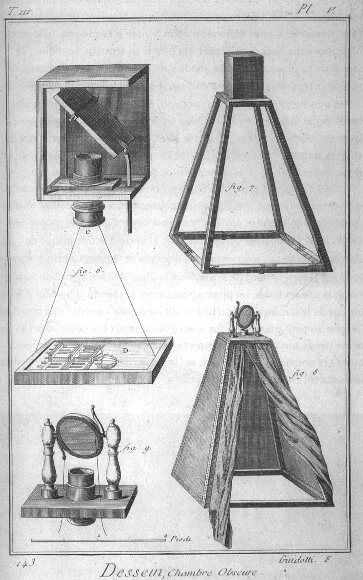
In all, this work comprises 17 volumes of text and 11 volumes of plates and illustrations in its first part, to which are added 4 other volumes of text and one volume of illustrations, representing no less than 18,000 pages of text containing 75,000 articles.
The publication of Diderot and d'Alembert's Encyclopaedia gave a major boost to encyclopaedic production. To this day, it remains the symbol of the Enlightenment. However, there were attempts to diminish the Encyclopaedia's impact. Several major religious works were published, including the Encyclopédie ecclésiastique. Despite these attempts, the Encyclopaedia remains a unique work and an excellent synthesis of the philosophical knowledge and worldview of the 18th century.
